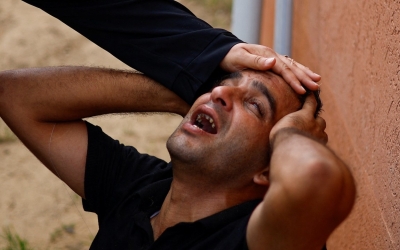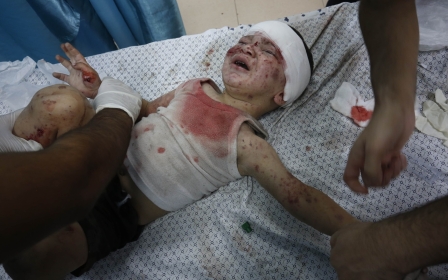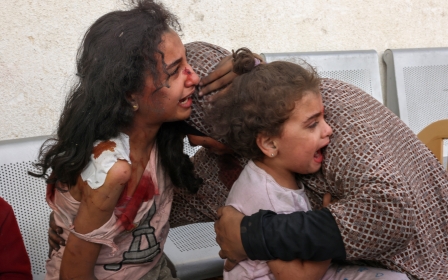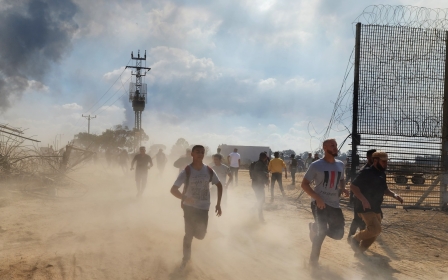Israel-Palestine war: When will Lebanon's Hezbollah enter the battle?
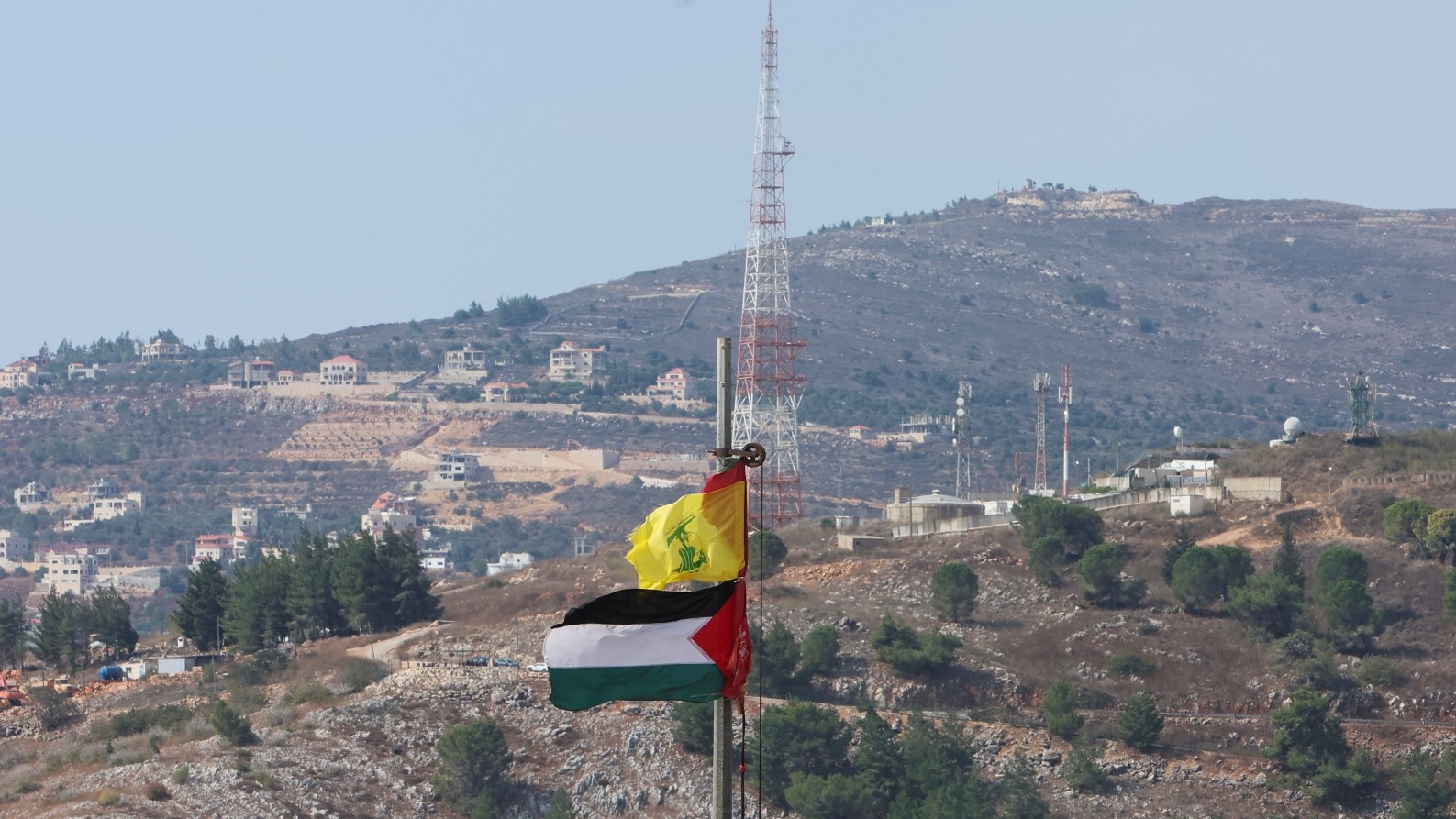
After the recent Israeli air strike on Gaza's al-Ahli Arab Hospital, which killed close to 500 people, and amid ongoing tensions at Lebanon's southern border with Israel, many are speculating about how Hezbollah's involvement in the conflict could change in the coming days.
Such questions come against the backdrop of sporadic skirmishes between Hezbollah and the Israeli military in southern Lebanon - a region often referred to as Israel's "northern front" - and centre on the potential for escalation.
Hezbollah has been engaging in tit-for-tat clashes with Israel since the outbreak of the Gaza conflict, as the party aims to maintain a deterrent stance while adhering to the established rules of engagement.
Clearly, Hezbollah is treading a delicate path in the south. It is not only fortifying the rules of engagement with the Israeli military, but also sending a clear message to both the Israeli and US establishments that it stands ready to engage at this critical juncture.
At the same time, there has been a notable mobilisation of Israeli forces towards the northern frontier, including reservists from elite units and battalions, while tanks and artillery are being positioned ahead of possible escalation.
New MEE newsletter: Jerusalem Dispatch
Sign up to get the latest insights and analysis on Israel-Palestine, alongside Turkey Unpacked and other MEE newsletters
The ambiguity surrounding Hezbollah's potential involvement in the war has inadvertently served Gaza's armed factions by keeping Israeli forces on alert, thereby dispersing the focus and resources of the defence establishment.
This constitutes a strategic advantage, hindering the Israeli military from concentrating its full might solely on the Gaza offensive, while adding a layer of complexity to the evolving geopolitical landscape.
Rockets launched
Hezbollah's reaction to Israel's actions has extended beyond their exchange of fire. A significant yet overlooked aspect in this conflict is the involvement of Palestinians from refugee camps in Lebanon, who have conducted attacks across the Blue Line into Israeli settlements.
Although many have overlooked these attacks, particularly given their relatively minimal impact on the Israeli military, the initiative represents a notable shift. Generally, Palestinians in Lebanon are restricted from entering the area of South Litani Sector (SLS), which is deemed a military zone, amid fears of unplanned military engagement with Israeli forces.
Follow Middle East Eye's live coverage for the latest on the Israel-Palestine war
But recently, and with Hezbollah's endorsement, individuals affiliated with the Lebanese branch of the Qassam Brigades, the armed wing of Hamas and Saraya Al Muqawama, the armed wing of Islamic Jihad, have launched rockets from Lebanon towards Israeli settlements. It is safe to say that such attacks have been absent from the Lebanese scene at least since the liberation of south Lebanon in May 2000. Its return shows the level of Hizbollah's willingness to engage in the ongoing war.
Additionally, it suggests that, should a second front of the war be opened in the north, Israel may face fire not only from Hezbollah but also from Palestinian factions that have trained intensively for such engagements.
The coordinated strategy among the 'axis of resistance' members seems characterised by a measured and calculated approach
Hezbollah's actions in southern Lebanon can be interpreted in two diverging ways. The first interpretation, largely held by Israeli and US analysts, posits that Hezbollah's restrained response signifies a lack of interest in contributing to the ongoing offensive in Gaza.
Despite expressing solidarity with the cause of the Palestinian people through paying allegiance to the notion of "unified fronts", a fundamental principle for the "axis of resistance", the Lebanese party appears reluctant to engage fully, primarily due to local and internal factors that could impede its capacity to wage a full-scale war against Israel.
This reluctance is perceived against a backdrop of Lebanon's severe economic crisis. Furthermore, although Hezbollah possesses an arsenal that has significantly grown over time, Israeli and US officials believe the group has depleted its human resources through involvement in conflicts across the region, particularly in Iraq, Syria and Yemen.
'Moment zero'
Western perceptions of Islamist parties, however, have often been misaligned with their actual ideologies and actions. The 7 October attack by Hamas was a case in point. Western governments seemingly believed they had subdued Hamas in Gaza, akin to how Fatah was incorporated into the Palestinian Authority in the occupied West Bank.
But the surprise attack showed a continued willingness on the part of Hamas to pursue its longstanding demands. Similarly, Hezbollah remains committed to its principles, particularly concerning the Palestinian cause - a strong indication that it would not hesitate to support Hamas if circumstances warranted intervention. Based on this interpretation, questions remain around the timing and conditions under which Hezbollah may intervene.
Hezbollah has already exhibited a willingness to intervene, albeit in a limited capacity. The coordinated strategy among the "axis of resistance" members seems characterised by a measured and calculated approach, rather than deploying all available resources simultaneously. Lebanese media outlets, particularly those aligned with Hezbollah, have pointed out that there would need to be a consensus among the axis of resistance prior to selecting a decisive moment - referred to as "moment zero" - when Hezbollah would escalate its involvement.
Unlike state actors, armed groups such as Hezbollah might employ a decision-making paradigm wherein large-scale massacres do not serve as the primary catalyst for retaliation or heightened engagement. The response patterns and justifications for military actions by both Hezbollah and Hamas underscore this distinction.
While the exact timing of this "moment zero" remains undetermined, speculation suggests that the looming ground offensive in Gaza, which has been endorsed by the US, UK, Germany and France, could trigger a more significant intervention by Hezbollah. This interplay reflects the integrative relation between different actors within the "axis of resistance".
Iran, for instance, appears to be spearheading diplomatic engagements, as evidenced by the regional tours conducted by its foreign minister. Although Iran seems inclined towards de-escalation, Hezbollah's actions in southern Lebanon send a clear signal of the group's readiness and willingness to engage militarily if deemed necessary.
The views expressed in this article belong to the author and do not necessarily reflect the editorial policy of Middle East Eye.
This article is available in French on Middle East Eye French edition.
Middle East Eye delivers independent and unrivalled coverage and analysis of the Middle East, North Africa and beyond. To learn more about republishing this content and the associated fees, please fill out this form. More about MEE can be found here.



